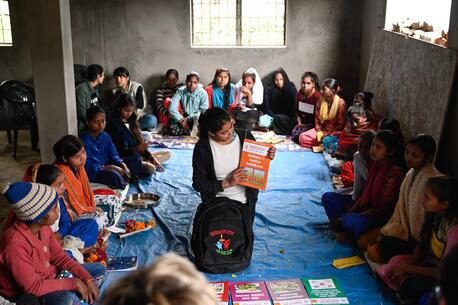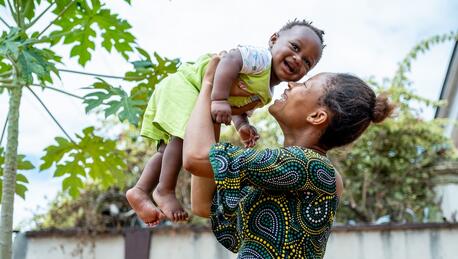A beautiful gift from Swaziland
Elizabeth Merola is Director of the Program Office at the U.S. Fund for UNICEF. There is something pretty amazing about children's art. Seeing the world through children's eyes, imagining what they are thinking when they put pen to paper or mold materials to create their own vision is remarkable. Someone very smart, probably my mother, once told me that you should never try to guess what a child is drawing because hearing them describe their art is an added gift (also, if you guess wrong you may devastate them!). Recently Mr. Jama Gulaid, UNICEF Swaziland Representative, brought a wonderful gift to the US. In fact, he brought 22 wonderful gifts - paintings made by children from Swaziland.
Elizabeth Merola is Director of the Program Office at the U.S. Fund for UNICEF. There is something pretty amazing about children's art. Seeing the world through children's eyes, imagining what they are thinking when they put pen to paper or mold materials to create their own vision is remarkable. Someone very smart, probably my mother, once told me that you should never try to guess what a child is drawing because hearing them describe their art is an added gift (also, if you guess wrong you may devastate them!). Recently Mr. Jama Gulaid, UNICEF Swaziland Representative, brought a wonderful gift to the US. In fact, he brought 22 wonderful gifts - paintings made by children from Swaziland.

These 22 paintings represent the strength and resilience of young children who have survived in one of the countries hardest hit by HIV/AIDS. In Swaziland, a small landlocked African country, the statistics paint a grim story - 42% of pregnant women attending antenatal clinics are living with HIV and more than 43% of Swaziland's households host a child who has lost one or both parents from AIDS.

In order to protect Swaziland's children, the most vulnerable in this raging epidemic, UNICEF is working with Swaziland's communities to empower them to care for the country's orphaned children and those made vulnerable by HIV/AIDS. At UNICEF-supported Neighborhood Care Points, community volunteers provide young children affected by HIV/AIDS access to a safe space, protection, medical care, education and recreational activities, including art programs. For older children, UNICEF and community volunteers provide training on self-care, parenting, and ethical living. The beautiful artwork that Mr. Gulaid brought to the U.S. to share with us evidences the remarkable strength of these young children and UNICEF's work to paint a different and more uplifting story for the children of Swaziland - a story of survival and hope and the power of communities to change their future.

